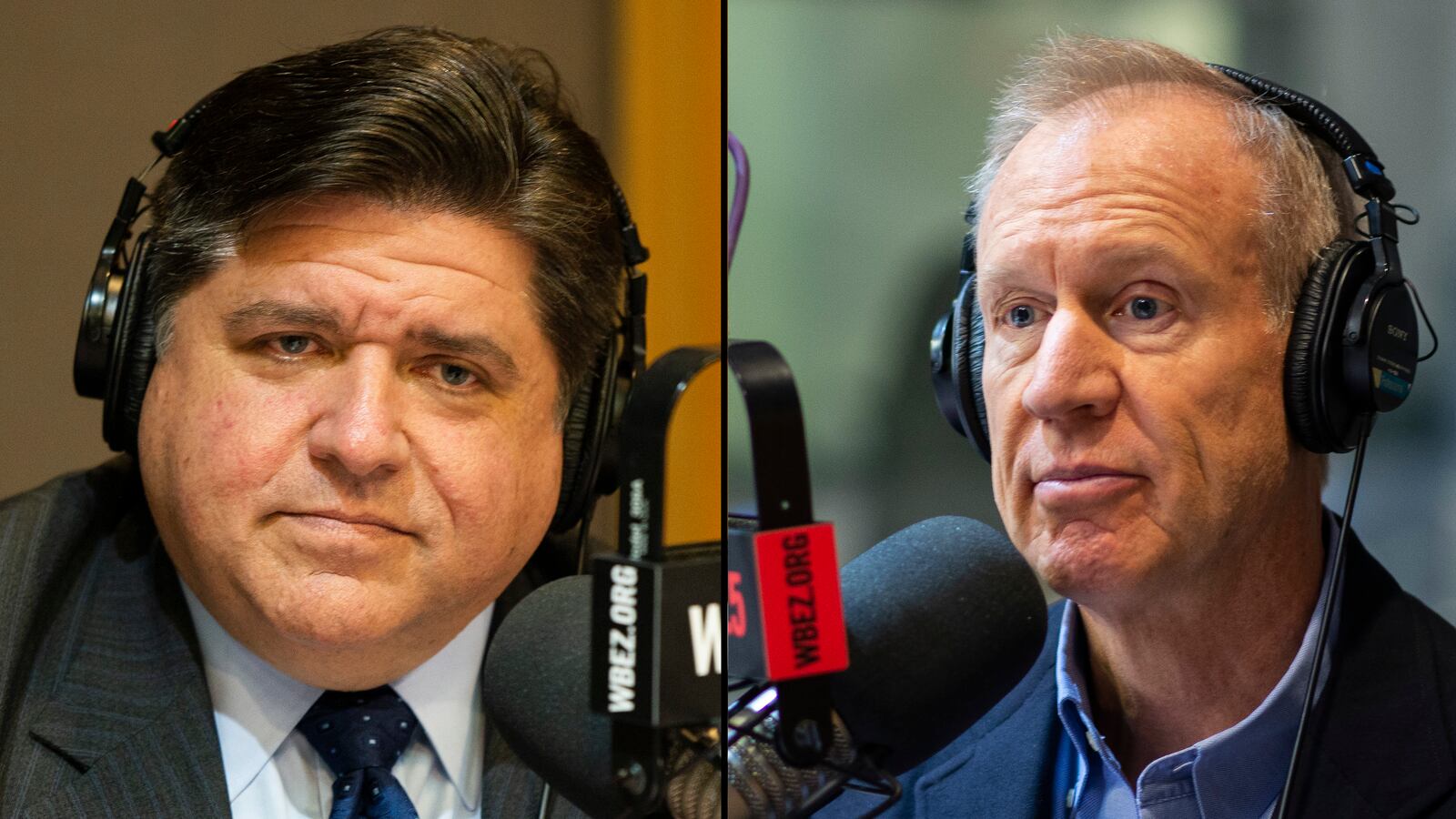Between the candidates’ barbs, and the back-and-forth over tax breaks and toilets, the candidates for Illinois governor have occasionally been spotted talking real policy. One such occasion: When Chalkbeat Chicago teamed up with the education team at WBEZ 91.5 Chicago for in-depth conversations about schools with Republican incumbent Gov. Bruce Rauner and Democratic candidate J.B. Pritzker.
In pre-interview questionnaires and live discussions, we pushed for their positions on everything from boosting the state’s profile in early childhood education to stemming the exodus of undergraduates from Illinois.
Click here to listen to the interviews.
Here’s what we learned.
On K-12 funding
Neither had an immediate solution to plugging the massive gap between the $8.4 billion Illinois spends on K-12 public schools and projections of what adequate school funding would cost. A 2017 overhaul in the formula Illinois uses to fund schools put the state on a 10-year path to closing the estimated $6.8 billion gap. But it’s never been clear how Illinois — which is staring at a big backlog of bills from its two-year budget impasse — is supposed to free up more money.
Rauner said he would find additional funding for schools by wringing enough savings from his revamp of the state’s Medicaid program. He said he’d also plug the gap by growing the state’s tax base through aggressive business recruitment.
Pritzker leaned on his progressive income tax proposal, which would wring more from wealthy residents and less from people in middle- and low-income brackets. In the short term, he told us in the Chalkbeat/WBEZ interviews that he’d look to legalize sports betting and recreational marijuana while working on a plan to reduce incarceration.
Both proposals have flaws: Rauner’s savings from Medicaid have not exactly been realized yet, because the revamp is just in its first year. Pritzker’s ambitious income tax plan has plenty of foes. And even if such a plan were to pass through the Legislature, it would require a state referendum — a process that would take until at least 2020.
On school choice
The candidates’ diverging views on school choice include charters as well as the tax-credit scholarship program squeezed into the school funding bill last year without public debate.
Rauner, who supports charter expansion, said he’ll personally contribute “more and more” of his own millions to the tax-credit scholarship program. “I’d like to have a billion-dollar program, but we’ve got to start somewhere,” he told us.
Pritzker, meanwhile, said he’d wind down the tax-credit scholarship program and put a moratorium on charter growth, even though he supports the concept of “choice” in districts such as Chicago, where students can choose between neighborhood schools, test-in schools, magnets, and charters.
Early childhood education
Both candidates have deep ties to early childhood education, with Rauner’s wife, Diana, steering the advocacy group Ounce of Prevention, and Pritzker supporting efforts through his philanthropy, the national Early Childhood Innovation Accelerator, as well as Ounce of Prevention and the First Five Years Fund.
Rauner touted his record on raising early childhood funding, and pushing for quality standards across the web of private and public providers who receive state dollars. Asked about a change in eligibility requirements that knocked tens of thousands of families off of public child care assistance programs, Rauner blamed the budget impasse and said, if elected, he’d work in a new term to bring in even more funding.
Since the interviews, Chalkbeat has chronicled other problems with the state’s child care assistance program for working families. A spokeswoman from the department that oversees the program said that the state is trying to hold providers who receive public dollars accountable to the same standards as private providers. You can read our coverage here.
Pritzker, meanwhile, has put out an early childhood plan that would, in his words, pave a path to universal 3- and 4-year-old preschool — something no other state has been able to fully execute. Asked why he’d shift scarce resources toward something so pricey, while also allocating more money toward the K-12 funding gap, he said it was a down payment on a continued investment.
An elected school board for Chicago
Rauner would veto a bill to restore an elected school board in Chicago, while Pritzker would sign it.
Electing school board positions “removes board members’ ability to make the best decisions for Chicago schools without the burden of re-election,” Rauner told us.
Boosting the state’s flagging university system
Pritzker told us he’d work to make college more affordable by increasing financial aid and restoring funding for colleges and universities to “pre-Rauner levels.” He’d also work on shoring up the credit transfer system so that community college credits transfer to public universities.
Rauner described his plans for a Discovery Partners Institute in Chicago, which he has described as a research institute that would bring together colleges and universities across the state with the goal of spurring business and entrepreneurship.

